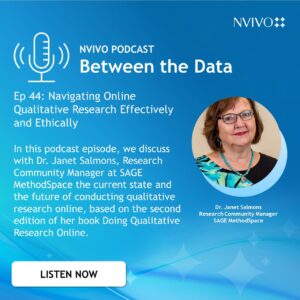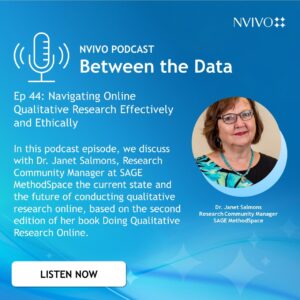
Dr. Janet Salmons interviewed by Dr. Stacy Penna, Engagement and Enablement Director
NVivo Podcast Between the Data Ep 44
Launched by SAGE Publishing in 2009, MethodSpace is an online community for the discussion of social and behavioral research methods, which gives scholars and students a space to share experiences and solve problems on a global scale.
Dr. Janet Salmons is MethodSpace’s Research Community Manager, a methodologist, or as she likes to call herself, “a researcher about research”, applying academic discipline to the activity of conducting research. She is also the author of “Doing Qualitative Research Online”, an acknowledged leader of the field.
In the latest episode of the NVivo Podcast, “Between the Data”, QSR’s Engagement and Enablement Director, Dr. Stacy Penna learns Dr. Salmons’ best-practice advice for conducting research online both effectively and ethically.
>> Listen to the Full NVivo Podcast Here
Dr. Salmons has been charting the opportunities and challenges of conducting qualitative research online since the early 2000’s. Across 20 years, the tools at the researcher’s disposal have ballooned: audio, webinars, chats, whiteboards and more. That’s just the one-to-one methods; add solicitations for comment on platforms like Twitter and further new paradigms emerge: clearly contributors will speak differently in public and in the constraints of 280 characters than they will in a more private and nuanced in-depth interview.
Janet says it’s therefore crucial to be both consistent and mindful of the medium used: “Every part of the research design needs to be approached differently when you are conducting it online. You need an iterative, holistic approach to think it through. Because once you make one decision, it will have implications for the other design decisions.”
Similarly, the online environment will present new ethical dimensions. Says Dr. Salmons, “On some social media platforms, if you are collecting data there, you can’t promise your IRB or ethics review board that you can protect that data - because someone else owns it.” But that’s only the start. Dr. Salmons’ book devotes three chapters to research ethics, but the fundamental challenge of the online environment is that the ability to reach more subjects than ever creates a distance and impersonality that might allow standards to drop. “I ask people to think about the integrity of the role of the researcher”, Dr. Salmons, “because nobody’s looking. What are your own values? And especially when the answers you’re getting are not the answers you were hoping to get, are you going to be true to the data?”
This is particularly important as, in a world where socio-politically we appear to be living in a time of public mistrust, Salmons feels that academics have a role to play in being cheerleaders for rebuilding that trust on the firm foundation of discipline and facts.
NVivo's role in conducting research at scale
Dr. Salmons says, “Whether you are a student or an experienced researcher, part of the challenge is just keeping track of all of the materials.”
But tools like NVivo are more than just a useful repository. Given her concern for a consistent approach to all participants in research and across what may be multiple platforms and sources of data, NVivo’s support for multiple media types means that qualitative researchers can both glean more insight and ensure rigorous review of the data.. She gives the example of video interviews, where the background – from the books on a shelf or the organized/chaotic nature of a room can be hugely informative. These are the visual cues which get lost in a pure transcription.
“It’s wonderful to be in the physical presence of other people”, says Salmons, but if you’re doing an interview on a video-conferencing platform, you can record the visuals, diagrams, photographs and artifacts that you’re discussing. You can see the response, a person’s facial expressions and nonverbals, and it’s all recorded in one place.” In this sense, NVivo allows for dramatically more analysis of multiple types of date for the researcher.
Listen to the NVivo Podcast for more of Janet Salmons’ taxonomy of online qualitative research and how NVivo is helping researchers make the most of academics’ digital assets.
To learn more about Dr. Salmons’ advice for online qualitative research, watch this on demand webinar Connecting for Collecting Data: Qualitative Research Online with Human Participants.

